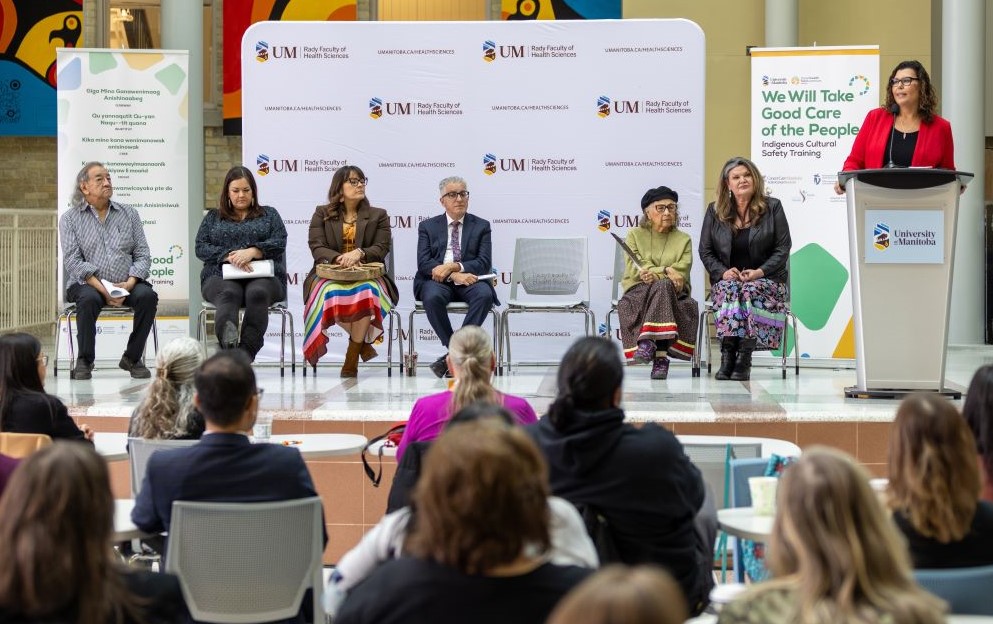
Dr. Marcia Anderson, vice-dean Indigenous health, social justice and anti-racism of the Rady Faculty, speaks at the launch of the new Indigenous cultural safety training program.
New training for Manitoba health workers to focus on culturally safe care for Indigenous patients
A program designed to ensure that Manitoba health-care workers provide culturally safe care to Indigenous patients has been developed by Ongomiizwin, the Indigenous Institute of Health and Healing in UM’s Rady Faculty of Health Sciences, in partnership with Manitoba’s health system organizations.
The program, announced on Nov. 26 by the University of Manitoba and Shared Health at an event that included a pipe ceremony and a feast, will be offered to health-care workers across the province, as well as to faculty members and learners in the Rady Faculty. It will support training for up to 3,000 people annually, with each health employer identifying teams from within their organization to participate each year.
Giga Mino Ganawenimaag Anishinaabeg, meaning We Will Take Good Care of the People in Anishinaabemowin, draws upon the knowledge and expertise of local Indigenous Knowledge Keepers and health-care leaders. Each training module will engage health-care workers in a range of activities and reflections.
“The purpose of the training is to address racism, foster culturally safe environments for Indigenous patients, and improve Indigenous health,” said Dr. Marcia Anderson, the Cree-Anishinaabe physician who is vice-dean of Indigenous health, social justice and anti-racism of the Rady Faculty of Health Sciences.
“Indigenous people make up 18 per cent of the Manitoba population. They have the poorest health status and the lowest life expectancy of any group. As an important step toward closing the health gap between Indigenous and non-Indigenous people, we’re providing staff at every level with the foundational knowledge to provide more racially just and culturally safe care.”
It’s essential for anyone involved in health care in Manitoba to acknowledge the multi-generational harms caused to Indigenous people by the health and residential school systems, Anderson said.
The training is supported through a grant of nearly $1 million awarded to Ongomiizwin through Health Canada’s Addressing Racism and Discrimination in Canada’s Health Systems program. It will be implemented as a partnership between UM and Manitoba’s health regions.
“All health-care workers have a responsibility to understand First Nation, Métis and Inuit peoples’ rights to culturally safe, equitable, dignified health care,” said Charlene Lafreniere, Shared Health’s provincial lead, Indigenous Health.
“Providing improved training across health organizations, including among decision makers and in the locations where care is provided, is one strategy we are implementing to address inequities and create a health system that is better equipped to deliver culturally safe, anti-racist health care.”
The training for UM staff will be provided through UM Learn. Health organization staff will take the training through the Shared Health Learning Management System (LMS). Private clinicians and external organizations can take the training through the Max Rady College of Medicine Continuing Professional Development LMS.
The training will consist of 10 online asynchronous modules that will take a worker a total of about 10.5 hours to complete, followed by an in-person workshop of two to three hours to consolidate learning.
Topics covered in the program include the impact of colonization on Indigenous health; strategies for recognizing and addressing racism in the health-care system; understanding the health-related Calls to Action made by the Truth and Reconciliation Commission; and how the location of Indigenous patients (urban, rural/remote or on-reserve) has implications for health-care delivery.
“Participating in this new training is a meaningful step that physicians, learners, trainees and other health workers can take as a step toward reconciliation and as part of their responsibility to redress harm,” said Melanie MacKinnon, executive director of Ongomiizwin and leader of Ongomiizwin-Health Services.
A team of Indigenous coach-facilitators will be available to participants as they proceed through the program. “These facilitators will be trained to support learners as they translate the content of the modules into meaningful action,” Anderson said.
Cultural safety training has been provided to Manitoba health workers since 2015. But this is the first such program to be created in Manitoba.
Its creation comes on the heels of other organizational pledges to take action to address Indigenous-specific racism. These include a pledge by the Canadian Medical Association, which recently apologized for its role, and the role of the medical profession, in past and ongoing harms to First Nations, Inuit and Métis Peoples in the health system. The College of Physicians and Surgeons of Manitoba apologized in 2023 for ongoing Indigenous-specific racism in the medical profession.
Watch the livestream launch of Giga Mino Ganawenimaag Anishinaabeg We Will Take Good Care of the People at 11 a.m. on Nov. 26.






